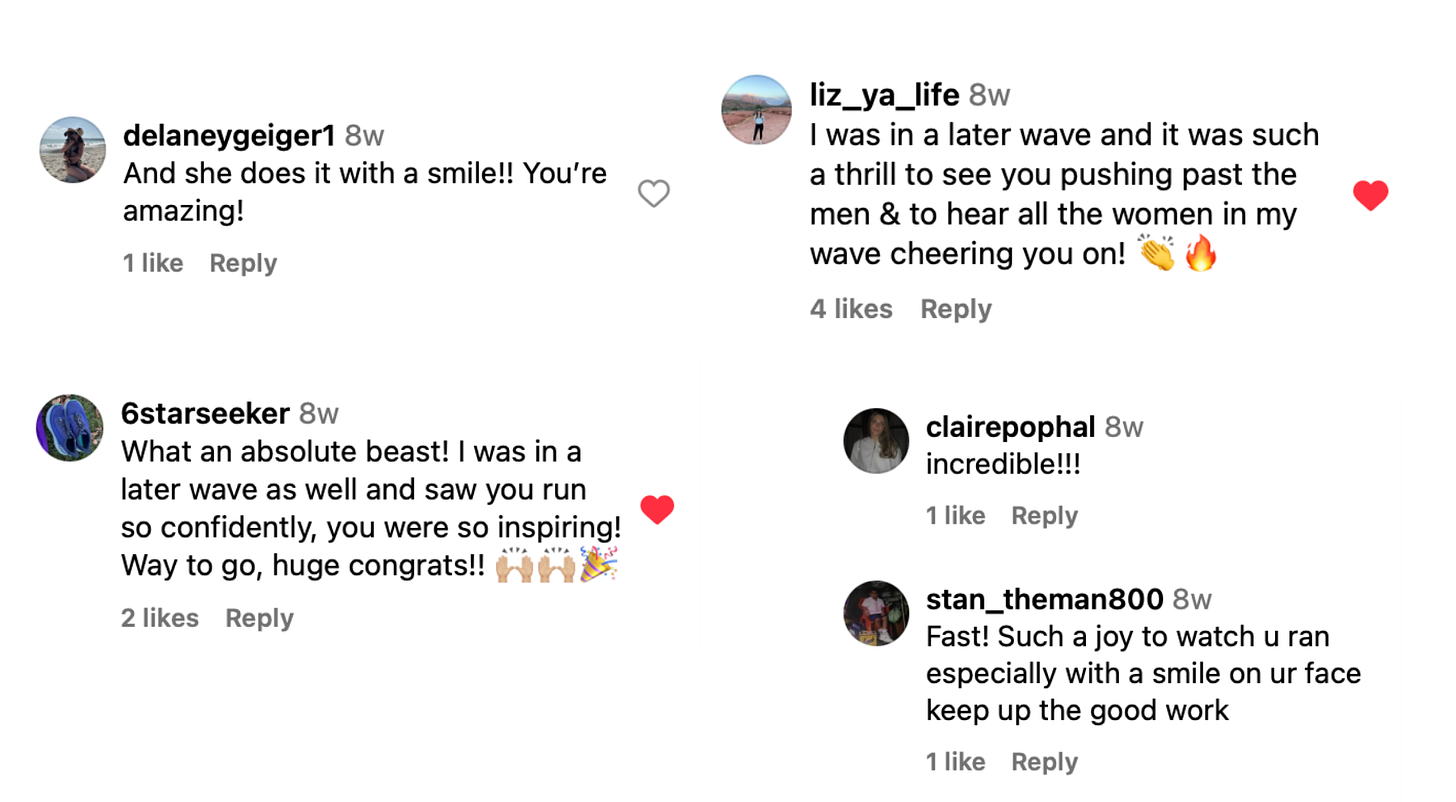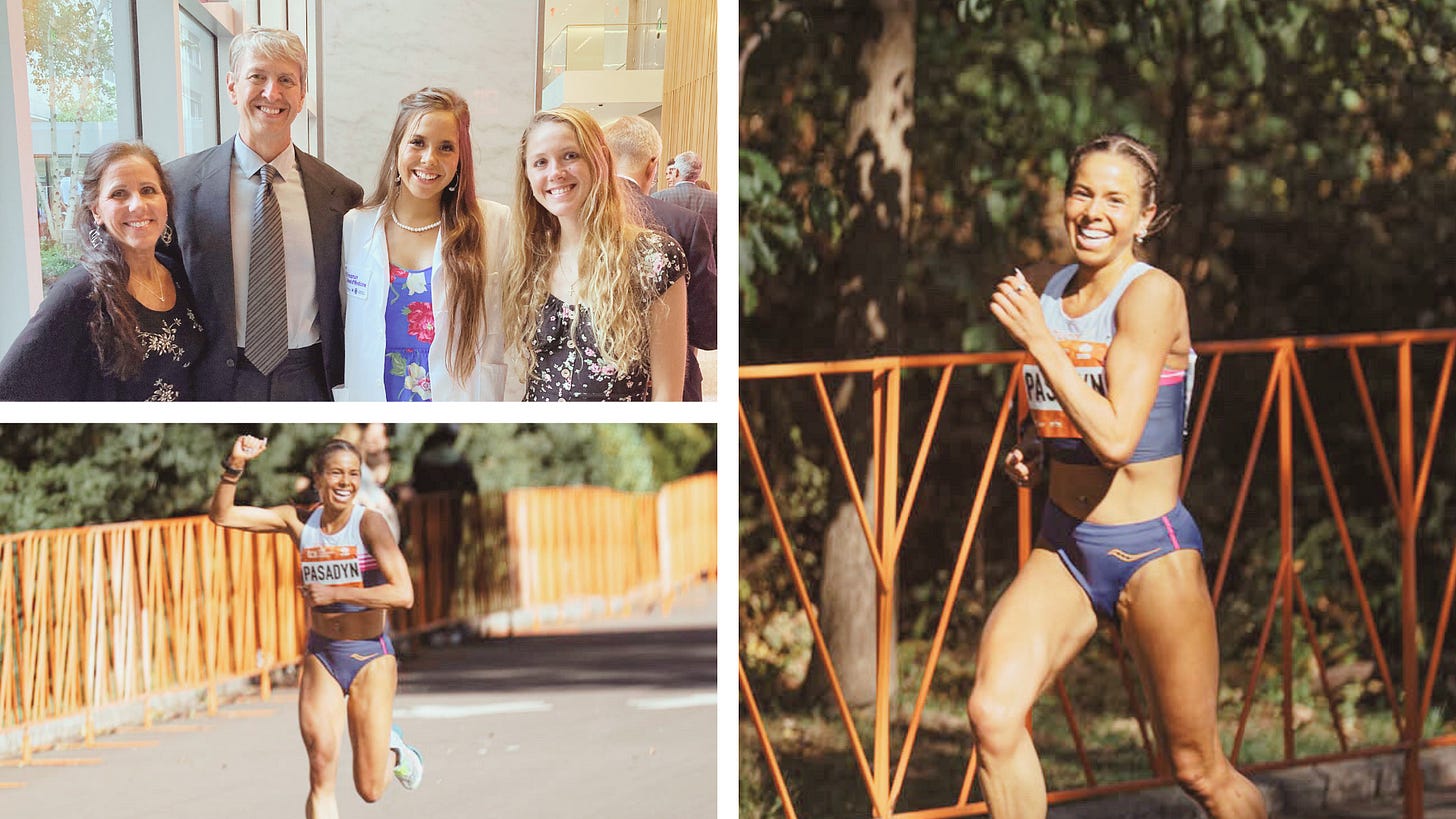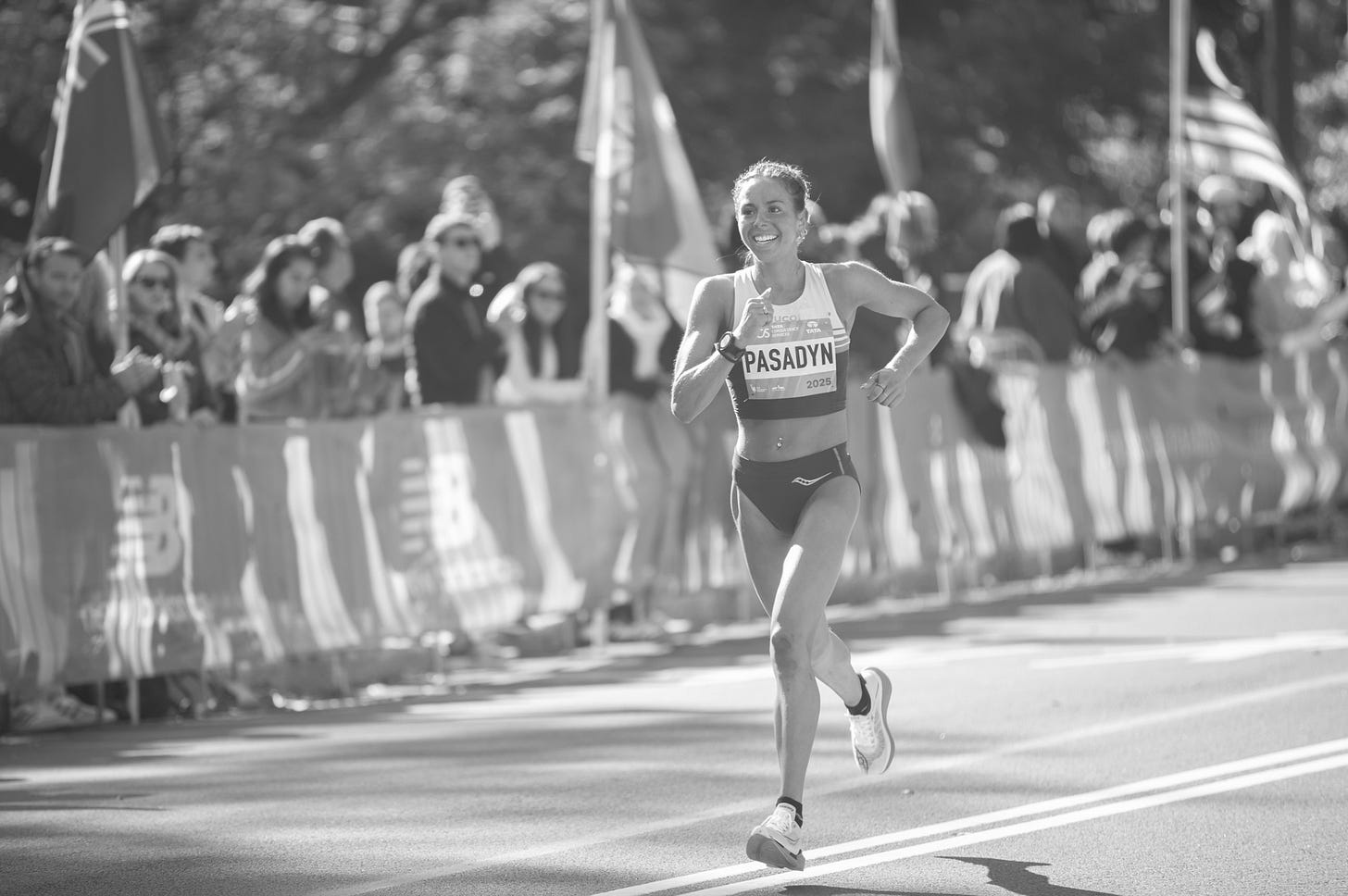Elite Athlete and Physician-in-Training Felicia Pasadyn on Dreaming Big in Age of AI
After achieving a time at the NYC Marathon that nabbed her a spot at the 2028 Olympic Trials, the remarkable Felicia Pasadyn shares how it's about striving and dreaming not just winning...
This fall I ran a 10-mile race here in New York City. It was the kind of race where the course loops back upon itself, giving all runners a glimpse of the elite competitors as they sail through to the finish line at double (or triple) the pace. It can be especially inspiring to see the first women coming in just behind the fastest men. During this particular race, though, it was one young woman who stood out as she glided along with ease looking way too happy for someone maintaining such a grueling speed. As soon as I got home, I looked up this tan, smiling strong runner. And that’s how I was first introduced to Felicia Pasadyn.
But as I soon found out, the happy demeanor is just the start of a long list of accomplishments and gifts that this runner possesses. For starters, she is a medical student at NYU’s Grossman School of Medicine—somehow also finding time to train as a long-distance runner. She’s a former NCAA champion swimmer and graduated from Harvard in just three years. In her last season at the school, Felicia was recognized by the NCAA for holding a 4.0 average during the 2022 record-setting swimming season.
Felicia then headed to Ohio State University, where she used her continued eligibility to swim for the Big Ten school while studying for a master’s degree in bioethics. Felicia’s accomplishments as a swimmer are too many to list here and alone would warrant a full profile of the scholar-athlete. But it was her breakthrough as a sub-elite NYC runner that caught my attention and earned Felicia an entire new cohort of fans.
After placing first in a number of local races this year, she was invited to compete in the elite women’s category at the New York City Marathon. And incredibly, she didn’t just run with the world’s best, Felicia came in first among New York women, 8th among American women, 14th overall among women, and also qualified for the 2028 Olympic Marathon Trials with a time of 2:35:17.
It’s an incredible accomplishment from someone who embodies the qualities we hope to see in the next generation—discipline, empathy, grit, wisdom, and joy. And these are the stories of the amazing “outliers” that need to be told.
Introducing the “Outliers”
As I’ve written about previously, while AI can help us achieve great things, we also need to consider the potential unintended consequences of the technology. For instance, AI systems tend to favor “safe” and “bland” responses. From a data science perspective, delivering the “most likely” or “average” answer, especially to questions that aren’t definitive and binary in nature, makes sense. But this can come at the expense of learning about “impossible” achievements and extraordinary people. In data terms, these extraordinary people are the “outlier” data points that can easily be filtered out—if they’re captured at all.
So, what does that mean in practical terms? Well, it could mean that safe answers woven throughout everything we access and the content our kids learn from can start to erode our imagination, creativity, and dreams. It’s the stories of other human beings that connect us to our own sense of what we can achieve—and we could lose this to AI systems. If these stories are “edited out” of content or never make it into what we read or experience, we risk becoming duller and less inspired in our thinking.
Through profiles of extraordinary people, I’m hoping to explore this topic in more detail. And I could not be more excited to share Felicia Pasadyn’s story as the inaugural profile for this section. Because unless you’re a runner here in NYC or have encountered Felicia in another context, you’ve likely never heard of her—but you likely will. Not only for her achievements but for Felicia’s fresh and unique perspective that highlights the power of those uniquely “human” skills that will be critical for kids to succeed in tomorrow’s world.
Meet Felicia Pasadyn
(Our chat edited for length and clarity…)
AI4F: You are, of course, an objectively amazing person, Felicia, but I also sense something different about your experiences and approach. So let’s start from high school. What has your journey been like? What has motivated you to succeed?
FELICIA: I was a three-sport athlete in high school. I also took a lot of advanced placement courses and was a very busy student athlete all during this time. I also grew up in a family that was extremely supportive of every dream that I had. And I dreamed big when I was younger.
I remember all the great moments, like being invited to the Olympic training center for being one of the top swimmers in the country. I also traveled a lot for swim competitions and for running competitions. I have three older sisters who also liked to run and swim and be very active. This was how I originally got into sports.
But for me, I also fell in love with the idea of sports. I loved the grit and self-determination that I felt every day at practice. It was about getting competitive with myself and then seeing the results. It’s like you get this little taste of success and all you want to do then is get back into the pool or back on the track and work even harder the next day.
“I always say hard work breeds success, and then success breeds hard work.”
—Felicia Pasadyn
Having people in my life, like really good friends and family, who I care about has also been a huge motivator. I know that my parents would wake up at 5 a.m., not because they wanted to, but because that’s when my swim practice was and they wanted to drive me there. So sometimes at swim meets or at hard practices, I would just think about them to keep going.
AI4F: My daughter is fixated on your Instagram feeds (personal and fitness), as they show your commitment, discipline, and, seemingly, grueling schedule. How do you do it?
FELICIA: I have this rule called the “hitting my four non-negotiables.” It’s a rule that I’ve had for myself since college, when, at the time, I would be walking over Charles River while at Harvard at 5 a.m. to get to swim practice. That practice would then be followed by a full day of classes that were very challenging intellectually. And then there would be another swim practice followed by study in the evening. So, I developed this concept to help me look back at my week and feel balanced and fulfilled ensuring that what I’m doing is sustainable.
First of the four is that I must get 8.5 to, ideally, 9.5 hours of sleep per night, or my brain and body do not recover very well. I also focus on fueling my body in a very functional and nutritious way. Second, I am the only one in my family who doesn’t live in Northeast Ohio at the moment, so I call at least one of them every single day just to make sure I have that touch point.
Third, I’m very close with my friends, and whether it’s scheduling a weekly potluck or a card game session, or even just a small walk to the local park, that fills my cup and helps me keep things in perspective. And fourth, is just booming back out and remembering my ultimate career goal. Because eventually I want to be a breast radiologist working with women and helping detect breast cancer—work that’s very important to me.
“By doing these [four “non-negotiables”] each day, I feel happy and fulfilled and very balanced.” —Felicia Pasadyn
AI4F: I write about AI and focus on the risks and opportunities that technology will continue to introduce into our lives. What I find interesting is how much you are an illustration of the power of having very “human” qualities. For instance, you seem incredibly focused on your experiences, and the people important to you, rather than necessarily just the reward at the end. What do you think of AI?
FELICIA: That’s all true. It’s also funny because I get asked questions about AI because of my focus on radiology. I often hear, “You know, AI is just going to take over that specialty.” But I’ll tell you what, until you can prove to me that a robot can comfort that woman with the tear rolling down her cheek as she gets a diagnosis… Until that day happens, I do not believe AI will take over radiology.
AI4F: What do you think about qualifying for the Olympic trials? Have you given much thought to what that means to you in your life?
FELICIA: It’s highly selective and honestly extremely unrealistic for me to think that I would leave as an Olympic team member. But still to go and compete against the best women in the country is the part I’m most excited about. I’m just in awe of the women that I get to compete against, and actually, the faster I get the more inspired I am by the athletes I’m exposed to at these races.
AI4F: I hope you also realize how you’re becoming quite an inspiration as well. My daughter has started to pay attention to how you train and was so excited to watch you during the live stream of the New York Marathon. What would you say to kids who now look up to you now?
FELICIA: First, I would say, the bigger you dream, the more exciting, your life becomes. Whether it’s something that you’re journaling, or thinking, or telling to a parent or a friend—if it scares you even a little, then it’s a big enough dream. Because having something to think about every single day and work toward—this is what gives you the most fulfillment in life.
I also see a tendency to pigeonhole students into one field or one sport. You don’t have to differentiate yourself so early. You should remain curious and open-minded for as long as you possibly can. I think it’s important to just keep wondering: What is out there for me in the world? Keep that question in the front of your mind for as many years of your life as you can. 💕
Have a story of someone you think is a remarkable example of holding fast to our humanity? A person that exhibits the “outlier” tendencies that are worth telling others about? Please let me know!






